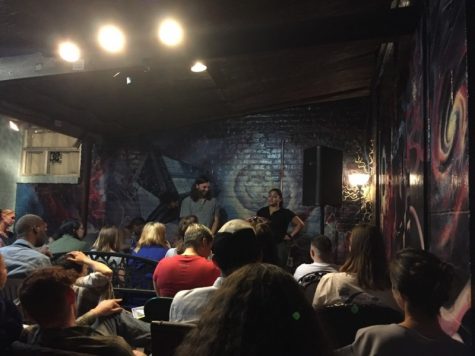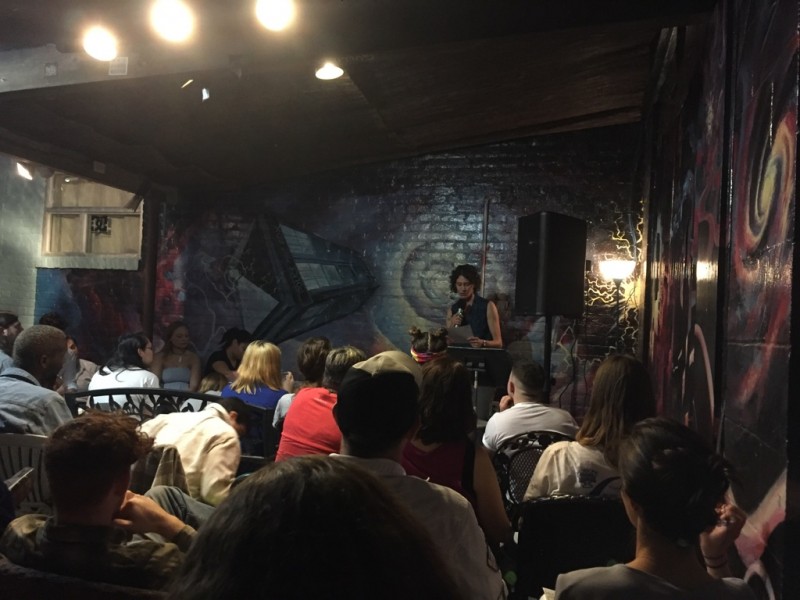CockTales tries to unpack toxic masculinity, raises concerns
Last Thursday, CockTales, an event seeking to change “toxic male culture” through monologues told by men, took place at Z’otz Cafe. CockTales aims to provide a platform for men to speak out against sexual violence, promote bystander intervention and generate dialogue among those whose voices event organizers believe are “noticeably missing.”
“Let’s stop treating sexual violence as a women’s issue and endorse a manhood in which it is ‘masculine’ and good to stand up for the rights, dignity, and humanity of women and girls,” the event description read.
Tulane Creative Writing Professor Whitney Mackman created CockTales in 2005 when she was an undergraduate at the University of Puget Sound. The collection of monologues, skits and TedTalks was assembled as what Mackman intended to be a brother event of “The Vagina Monologues,” and the two were typically held in conjunction.
Last year, Mackman chose to bring CockTales to Tulane’s campus for the first time. It was then that Brooke Hanraty, now president of Students United for Reproductive Justice, saw the show, prompting her to get involved.

Two performers read a monologue about sexual assault and forgiveness.
Seeing parallels between CockTales’ mission and SURJ’s dedication to reproductive justice, including aspects like domestic violence and abuse, Hanraty hoped SURJ would be willing to sponsor the show. After discussion among its members, however, SURJ members made the decision to withdraw sponsorship of the event. At the recommendation of Title IX Coordinator Meredith Smith, Mackman reached out The Sexual Aggression Peer Hotline and Education, asking them to come to the event as support for students. SAPHE made the decision not to engage with the event after seeing the description.
“SAPHE wholeheartedly believes in deconstructing structures of toxic masculinity and rape culture on campus,” SAPHE said in its statement regarding the event. “However, we do not believe that CockTales (a performance described as “monologues/confessions from men who have caused a woman’s ‘me too'”) is an appropriate forum for this dialogue.”
Some students raised concerns about the language that was initially used to describe the event and suggested that CockTales was potentially heteronormative and lacked representation of transgender and non-binary individuals. Specifically, students highlighted the use of the name “CockTales,” the sole focus on male participation in sexual violence and the almost-exclusive spotlight on experiences between straight, cisgender men and women as being exclusionary in nature.
There were also concerns that a narrative from the perspective of a male participating in sexual or domestic abuse may serve to normalize the behavior or create undue sympathy.
“Unlike Hers, Theirs, Ours, a production that utilizes stories and experiences written by members of the Tulane community in order amplify and validate the experiences of students on this campus, several of which are written by survivors, CockTales chooses a platform to address perpetration that has the potential to validate the experience and decisions of perpetrators,” SAPHE’s statement said.
Despite concerns from the community and a lack of student sponsorship, the show continued at an off-campus venue and drew a substantial turn out. Sexual Trauma Awareness & Response was also present at the request of event organizers to offer support and post-show sexual assault services. Preceding the show, Mackman addressed the lack of intersectionality in CockTales.
“I understand, trust me, that we have more bodies and genders and non-binary labels, but for the purposes of this show, and due to the nature of most of the monologues, I just wanted you to know that we are not trying to define people based on the presence of a penis or a vagina or act as if gender and sex can be simplified so easily.” Mackman said. “In no way are we trying to exclude any body, we are just trying not to keep you here all night.”
Over the course of the night, CockTales prompted discourse regarding toxic masculinity and the different ways it can manifest itself through its monologues, which touched on rape, coming of age and reflection. But while some of the topics raised some concerns, Hanraty said she feels their inclusion adds an important element to CockTales.
Participants in the event also said they thought that CockTales could be a powerful opportunity to engage with the Tulane community in light of the recently released Climate Survey results.
“We need to find as many ways as possible to reach out to young men to help them understand the urgency and the proximity of this problem,” Mathematics Professor and CockTales participant Scott McKinley said. “The language of CockTales is coarse at times, but it’s meant to resonate with young men in a way that I hope helps wake people up. Sexual violence is not an abstraction; it is happening within your social circles. And the change that is needed requires work from all of us.”
Canela López contributed to the reporting of this article.
Update April 19, 5:09 p.m.: The story initially incorrectly stated that SAPHE “withdrew its support” for the event, alongside SURJ. It has been corrected to reflect that SAPHE never expressed support for the event.
Update April 19, 2:51 p.m.: An earlier version of this story included a link to a TED talk that was not affiliated with the CockTales event, nor was it used as a monologue. This link has since been removed.
Update April 20, 3:57 p.m.: A sentence was added to the story to clarify that SAPHE was reached out to for support during the show at the recommendation of Title IX Coordinator Meredith Smith, not asked to sponsor the event.
Update April 20, 4:00 p.m.: CockTales was created in 2005 by Whitney Mackman alone. This was corrected as it previously indicated Mackman created the event with a group of friends in 2006.
Leave a Comment
Your donation will support the student journalists of Tulane University. Your contribution will allow us to purchase equipment and cover our annual website hosting costs.




Chandler • Apr 23, 2018 at 10:21 am
“I understand, trust me, that we have more bodies and genders and non-binary labels, but for the purposes of this show, and due to the nature of most of the monologues, I just wanted you to know that we are not trying to define people based on the presence of a penis or a vagina” Give me a break. This isn’t good enough. It’s not good enough to just understand, it’s time for representation and action. The event is called COCKtales, it IS defining people based on the presence of a penis